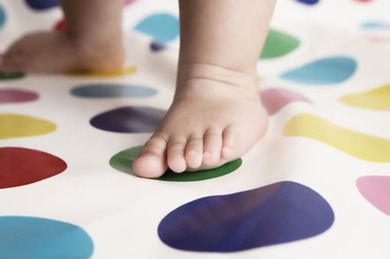
Early intervention is a service for babies or toddlers who have developmental delay or disability. Typically, this ranges from birth till age three though some children still require help after age three.
The aim of early intervention focuses on teaching the child basic skills which normally develop in the first three years of life but which the child is struggling with. There are five broad categories:
- Cognitive (thinking, learning, solving problems)
- Physical (rolling, reaching, transferring, crawling and walking)
- Communication (listening, talking, understanding)
- Self-help (eating, dressing)
- Social/Emotional (playing, happy, integration, security)
If you suspect that your child lags behind when it comes to milestones like lifting the arm, sitting up, interaction with others or rolling it is important to let the paediatrician know. Typically, you will then be referred to see a physiotherapist who heads the early intervention team. Diagnosis is not the end goal in early intervention however, birth asphysxia, cerebral palsy, erbs palsy, trisonomy 21 (down syndrome), autism spectrum disorder, congenital defects are some of the common diagnosis eventually made as a child goes through the process.
The ultimate goal is to support the family members and child to ensure optimal development of the child in order to participate in family and community activities. The attainment of this goal varies with each child.
Services which the child may need may include:
- Audiology or hearing services.
- Medical services
- Nutrition services
- Occupational therapy
- Orthotic/Prosthetic devices
- Physiotherapy
- Speech therapy
Developmental Milestones for Children
| Motor | Sensory and Thinking | Language or Social
|
|
| 3 months | Lift head from shoulder and lying
Turn head from side to side Track moving objects with eyes Grasp toys Wiggle and kick arms and legs |
Turn head to bright lights and colours
Turn head towards sound of human voice Recognise bottle or breast Respond to shaking toys or bells |
Making cooing or gurgling sounds
Smile in response to smiles Facial expressions and crying to show discomfort of hunger or fear Is soothed by calming voice or when held |
| 6 months | Hold head steady
Reach for and grasp objects Plays with toes Help with holding feeding bottle Transfers toys from one hand to the other Sit with minimal support Pulls up to a sitting position Roll over Bounce in standing position |
Opens mouth for spoon
Imitate familiar actions |
Babble and sing song sounds
Recognises familiar faces Laughs in delight Scream if annoyed Smile at own image |
| 12 months | Drinks from cup with help
Finger feeds using thumb and forefinger Points with first finger Takes blocks out of a container Sits well without support Crawl on hands and knees Pulls self to stand Stand alone momentarily Walk with one hand held |
Copy sounds and actions
Respond to music with body motion Accomplish goals like crawling to a toy Look for objects such as block behind a box |
Babble which sound like talking
Saying first word Recognize family member names Show affection to familiar adults Raises arm to be picked up Understands simple commands Show apprehension about strangers |
The PhysioCraft team would work with the family to identify, plan and achieve the goals which are set with the child. The process is usually a lengthy one which requires reinforcement from the family when medical personnel is not with the child. If you have any questions or require more information, you can reach us by calling +2348035670888 0r +234 8171940921 or fill our contact form. We would answer any questions you have for free.

